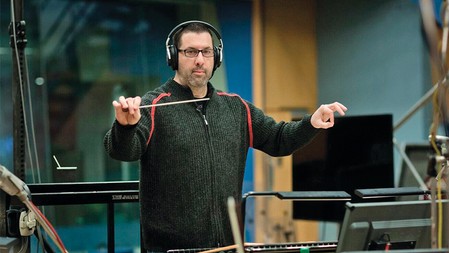Emmys 2018: The Orchestral Arms Race of TV’s Sci-Fi
By Jon Burlingame
LOS ANGELES (Variety.com) – Some of the most compelling music for television these days is being written for science-fiction and fantasy shows, where the sound palette ranges from orchestral arrangements to eerie vocals and synthesizers, and reflects a wide spectrums of styles.
Christopher Lennertz, who recorded a 53-piece orchestra in London’s Abbey Road for the Netflix reboot of “,” says the music he produced is “testosterone-driven when it needs to be, but it’s very poignant when it comes to the kids and the family.
I didn’t want to hold back on the emotion, the heroism, the sadness, romance or hope.”
Lennertz incorporated a snippet of John Williams’ theme from the original ‘60s series, a nice tip of the hat to today’s most respected film composer back when he was still toiling in TV.
Similarly, Jeff Russo found that he could not launch CBS All Access’ “Star Trek: Discovery” without a nod to Alexander Courage’s now-famous fanfare from the ‘60s series.
Russo was inspired by “Trek” creator Gene Roddenberry’s optimistic ideas about the fu-
ture. His 64-piece L.A. orchestra (twice the size of Courage’s original band) was wholeheartedly endorsed by producer Alex Kurtzman — along with Russo’s themes for many of the main characters, the ship and the Klingons they meet.
“Music is another part of the screenwriting process in a way,” Kurtzman says. “Once you embed a theme in the audience’s mind — a musical idea relating to characters or a location — whether they are totally conscious of those themes or not, it affects their emotional reaction to the storytelling.”
The season’s biggest, boldest sound may well have belonged to “The Orville,” creator-star Seth MacFarlane’s lighthearted homage to “Star Trek” on Fox. Composer Bruce Broughton (a 10-time Emmy winner) had 75 musicians for the pilot, while fellow composers (and previous Emmy winners themselves) John Debney and Joel McNeely conducted L.A. orchestras averaging 70 to 85 members for the episodes that followed.
“Seth wants these to have a big, cinematic feeling,” says Debney. “It’s huge for television, and it’s the biggest gift a composer can get.”
McNeely adds: “Seth is a fantastic musician. If he had time, I suspect he could have composed these scores himself.”
The challenge, both note, was finding the right tone, as “we go from funny, comedic scenes to big, adventurous battle scenes,” says Debney.
“The score never references the comedy; Seth wants it always to be played straight,” McNeely says.
English composer Harry Gregson-Williams composed his first TV theme for Amazon’s “Philip K. Dick’s Electric Dreams,” a fast-moving hybrid of orchestral and electronic sounds. Producer Michael Dinner asked for “a mashup,” Gregson-Williams says. “He wanted it to be quite eccentric. It’s got some harsh guitar, some sweet piano, a classical string section, and a distant, slightly distorted vocal.”
It fell to composer Michael A. Levine to create a “siren song” for the dangerous mermaid of Freeform’s “Siren.” “I wrote that piece before I even had footage of the scene,” Levine says. To sing it, he cast New York singer Mariana Barreto for her simultaneously “down-to-earth and transcendent” vocal quality.
Levine also felt he needed to evoke the sounds of the ocean. A trained violinist, he played “artificial harmonics” on his ciola (a viola whose strings create a darker sound) to suggest whale calls. “Overdub a bunch of them, put some echo on it, and you’re in the sea,” he says.
The small-town, Pacific Northwest setting led him to use several Native American flutes, but most of the remaining sounds for the score were created by Levine in his studio.

